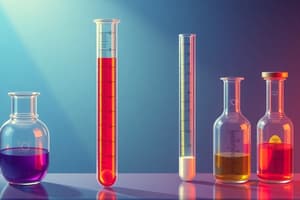Podcast
Questions and Answers
What is the purpose of a pipette?
What is the purpose of a pipette?
- To create a meniscus in the liquid
- To measure the temperature of a liquid
- To measure the volume of a liquid and place it into another container (correct)
- To add an indicator to a solution about to be titrated
Which feature of a pipette makes it suitable for precise volume measurements?
Which feature of a pipette makes it suitable for precise volume measurements?
- The variety of designs available
- The rubber bulb at one end
- The narrow tips on both ends (correct)
- The transparency of the glass tube
How does a pipette differ from a volumetric flask?
How does a pipette differ from a volumetric flask?
- A pipette can measure temperature, while a volumetric flask cannot
- A pipette is designed for transferring liquid, while a volumetric flask is not
- A pipette has a special cap, while a volumetric flask does not
- A pipette is used for measuring an exact volume of liquid, while a volumetric flask is not (correct)
What is the main purpose of a buret?
What is the main purpose of a buret?
What is the function of tongs and forceps in a laboratory?
What is the function of tongs and forceps in a laboratory?
What is the purpose of spatulas and scoopulas in a laboratory?
What is the purpose of spatulas and scoopulas in a laboratory?
What is the primary use of a pipette in a laboratory?
What is the primary use of a pipette in a laboratory?
Which laboratory apparatus can easily be clamped to a ring stand for heating and shaking?
Which laboratory apparatus can easily be clamped to a ring stand for heating and shaking?
What is the potential consequence of heating a capped Erlenmeyer flask?
What is the potential consequence of heating a capped Erlenmeyer flask?
When should latex gloves be used in a laboratory?
When should latex gloves be used in a laboratory?




